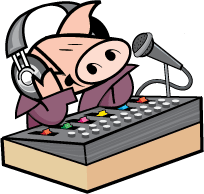 Cue the Music!
… and there’s absolutely no business like show business. OINK!’s very own show biz editor has been digging and delving and getting to grips with the ups and downs and the ins and outs of the “music biz”. And here he is… Hammond Egg!
“Cue The Music!” If you’re sitting in the control room of a television studio recording the latest episode of, say, “X Factor” or many other types of variety, music or chat show, you will, undoubtedly hear these words. “Cue The Music” means more than just start playback of the music which runs over the opening titles of a programme. It means the show’s started. There’s no going back now. It’s curtain up. “It’s showtime!”
We all came to actually hear the words “Cue The Music” in one of the first great music shows of the 1970’s: “Supersonic”. Right at the start of each programme the viewers saw - and heard - its director, Mike Mansfield, say the magic words.
But ever wondered, how that music ended up at the beginning of a programme? Someone had to write it. And before they could write it, they had to be commissioned to do so. And before they could do that, they had to be fairly well-known as a composer. Or lucky. Or both.And how does that happen?
Who Writes the Music?
Well, it’s a long story story - but to make it short, whoever wants to get into music has to have some talent: that is, they have to be able to compose something that’s good. Really good. Usually, though not always, they would have studied music at a music school or university. So they can not only compose the music, they can arrange it for all the other instruments you hear. Normally, they would then have a bedroom! Well, we all have a bedroom, but the guys who make music, invariably start making music in their bedrooms turning them into mini music studios. Computers have all sorts of components for making music, and these days it’s much easier than it ever was to produce a passable piece of music which almost sounds as though it was produced in a professional recording studio.
Getting There
Having produced something, the composer needs to play it to someone. They’ll do this either by gigging around, playing in clubs, pubs or wherever, making connections in and around the music business until they get a break and meet someone, who knows someone, who needs some music for, say, a film, or a singing artist, or documentary. It’s slow headway. Can take years. Can be never. But, if you have that ‘something’ and you’re lucky - you’ve got to be lucky, and persevering, you’ll meet a producer, or a production assistant, or someone who knows them and you’re introduced. You’ll play them your tracks. If they like it, they MAY give you a chance to compose something for their next project.
You won’t be alone. They’ll be others who have been contacted, and the producer and director will choose the track or piece of music they like the best.
Then they’ll commission you to write the piece for the opening of their next tv show, or the theme for a film or documentary or tv series, and you’re in!
If you’re already known, or semi known as a composer, you’ll get referred by one producer or production assistant to another. Or you would have got yourself an agent – someone who promotes your talent and takes 10 to 15% commission from whatever you’re being paid for doing your work.
Your Agent Just Called!
If you’re big-time, your agent will be asked by the producer to write the music for them. Or, you’ll be part of a production stable or team of people who the producer usually uses for all his productions, be they tv or film: Monty Norman wrote the theme for the James Bond films and John Barry, when he was alive, wrote most of the Bond films’ music. Eric Spear wrote the theme for Coronation Street. Simon Cowell wrote the theme music for X Factor himself, short-cutting the whole process! Danny Elfman wrote The Simpsons.
The music has to be produced and made to sound the way we hear it. That’s a whole different process - and article.
Money? Well, yes, if you’re lucky enough to be the writer of the music that’s cued, you’ll make a fee for writing it, then usually you’ll receive “royalties” each time the music is played. Royalties are small amounts of money paid to the composer – and lyric writer, if it’s a song – each time the music is heard. The royalties are paid mainly by the broadcaster, tv or radio, or record company You also get royalties when your music is heard in cinemas, hotels and even lifts or shops! The music is published by a music publisher who is there to promote the use of the music any way they can. And the music publisher shares in the royalties, normally 50/50 with the writer(s). Simon Cowell is his own music publisher so he takes the lot!
When you next switch on the TV, remember, as the programme starts, someone has said “Cue The Music” and a whole process of people, music making, business negotiating and luck has gone into what you’re about to hear! “Cue The Music!” It’s showtime!
 back back |













